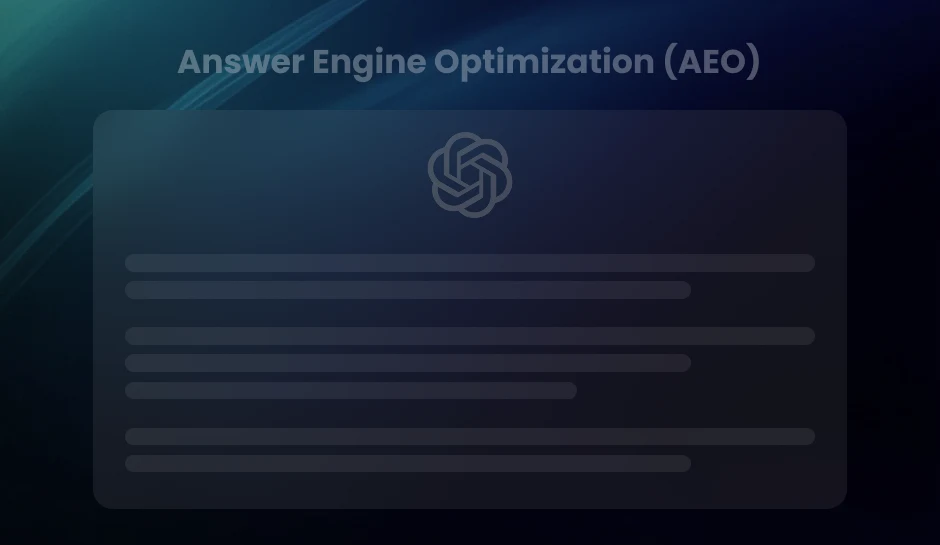
AI Account-Based Marketing Examples You Cannot Ignore in 2025
Traditional account-based marketing often struggles with wasted budget, misaligned sales and marketing efforts, and low engagement rates. AI-powered ABM changes this by leveraging real-time insights, predictive analytics, and automation to target high-intent accounts, personalize interactions, and maximize marketing impact more efficiently.
What if you could predict exactly which accounts are ready to buy, personalize outreach at scale, and engage decision-makers at the perfect moment?
For years, businesses have struggled with low engagement rates, wasted marketing spend, and misalignment between sales and marketing teams in account-based marketing (ABM). Traditional methods rely on static account lists, guesswork, and one-size-fits-all messaging, leading to missed opportunities and inefficient campaigns.
AI is changing that. By leveraging real-time data, predictive analytics, and automation, businesses can identify high-intent accounts, deliver hyper-personalized experiences, and optimize outreach across multiple channels—all with greater precision and efficiency. The result? Higher conversion rates, faster sales cycles, and a measurable impact on revenue.
Why AI is a Game Changer in ABM
AI reshapes Account-Based Marketing (ABM) by providing deeper insights, faster decision-making, and highly targeted outreach. Machine learning algorithms process vast amounts of customer data, identifying patterns that manual analysis would miss. Predictive analytics assesses buying intent, allowing sales teams to focus on high-value prospects.
Chatbots and AI-powered assistants handle initial interactions, qualifying leads before human intervention. Natural language processing (NLP) improves sentiment analysis, ensuring messaging aligns with audience preferences. Automated workflows streamline campaign execution, reducing manual effort while maintaining precision.
The Importance of Data in Crafting AI-Driven ABM Campaigns
Predictive models lose accuracy without high-quality information, reducing a campaign’s effectiveness. Customer relationship management (CRM) platforms, website interactions, social media engagement, and third-party data sources contribute to comprehensive profiling.
- Behavioral Data:
- Firmographic Data:
- Technographic Data:
- Intent Data:
AI tracks prospect interactions, analyzing how users navigate websites, engage with content, and respond to emails.
Data on company size, industry, and revenue enables segmentation, refining targeting strategies.
Understanding a prospect’s existing technology stack helps craft relevant messaging.
AI evaluates search activity and content consumption to assess purchase likelihood.
Real-time data processing ensures campaigns remain relevant. AI-driven systems adjust messaging based on new insights, maintaining precision at scale.
How AI is Transforming Account-Based Marketing
AI is reshaping account-based marketing by making it more data-driven, automated, and hyper-personalized. Businesses no longer have to rely on manual segmentation, static account lists, or reactive outreach. AI enables marketing and sales teams to identify high-intent accounts, personalize engagement at scale, and optimize every interaction based on real-time insights.
Predictive Targeting
AI-powered platforms analyze search behavior, firmographics, and buying signals to predict which accounts are most likely to convert. This eliminates guesswork and ensures that sales teams focus only on accounts showing real purchase intent—long before they reach out.
Hyper-Personalization
AI dynamically adjusts ad creatives, email sequences, and website content based on an account’s behavior, industry, and stage in the buying cycle. This ensures that every interaction is relevant, increasing engagement with decision-makers and improving conversion rates.
Automated Multi-Channel Engagement
AI ensures seamless coordination across multiple platforms, optimizing messaging on LinkedIn, programmatic ads, email, and AI-powered chatbots. This allows businesses to maintain consistent and contextually relevant engagement without overwhelming prospects with repetitive outreach.
Real-Time Sales Intelligence
AI-driven analytics platforms like DiGGrowth provide real-time insights into how key accounts interact with marketing assets. By tracking content engagement, ad clicks, and website visits, AI helps sales teams prioritize outreach and engage accounts at the right moment, improving response rates and deal velocity.
AI Account-Based Marketing Examples Driving Results
AI-driven account-based marketing transforms how businesses identify, engage, and convert high-value accounts. Companies can optimize their marketing and sales efforts to achieve measurable growth by leveraging predictive analytics, automation, and real-time insights.
One critical challenge in ABM is attribution—understanding which efforts contribute to revenue and which do not. This is where DiGGrowth, an AI-powered analytics and attribution platform, helps companies track account engagement, ad performance, and conversion paths, ensuring data-driven decision-making. Here are three examples of AI-driven ABM success:
Example 1. A SaaS Company Increased Its Deal Closure Rate by 40% Using AI-Driven Predictive Analytics
A SaaS company faced difficulties in prioritizing high-intent accounts, leading to inefficiencies in outreach and lower deal closures. To overcome this, they integrated AI-powered predictive analytics, which helped them:
- Analyze historical engagement data and external intent signals to identify accounts most likely to convert
- Automate account scoring to ensure sales teams focused on high-potential leads
- Use DiGGrowth’s multi-touch attribution to track engagement across ads, emails, and content interactions
By aligning sales efforts with AI-driven insights and measuring campaign performance through DiGGrowth, the company boosted deal closures by 40% and significantly improved sales pipeline efficiency.
Example 2. A Cybersecurity Firm Used AI Chatbots to Engage High-Value Accounts, Reducing Sales Cycles by 30%
The company struggled with delayed lead qualification and missed engagement opportunities, resulting in long sales cycles. They introduced AI-driven chatbots to:
- Automate real-time conversations with targeted decision-makers
- Qualify leads instantly using AI-powered conversation flows
- Track chatbot interactions through DiGGrowth’s engagement analytics, linking chat-driven touchpoints to revenue
The firm reduced its sales cycle by 30% by integrating AI-driven chat with real-time attribution tracking, ensuring faster deal closures and a more efficient buyer journey.
Example 3. An Enterprise Tech Company Improved Its Ad Spend Efficiency by 50% With AI-Powered Targeting
With rising customer acquisition costs and declining ad engagement, this company needed a way to optimize its ad spend. AI-powered targeting helped them:
- Identify high-value accounts showing strong intent signals
- Adjust ad creatives dynamically based on real-time engagement insights
- Use DiGGrowth’s attribution modeling to determine which ads directly influenced revenue
With AI-driven optimization and clear attribution insights from DiGGrowth, the company achieved a 50% increase in ad spend efficiency, ensuring that every marketing dollar contributed to actual conversions.
Why AI-Powered ABM is Essential in 2025
Traditional account-based marketing relies heavily on manual processes, static account lists, and broad segmentation, often leading to missed opportunities, inefficient spending, and poor alignment between sales and marketing teams. AI is changing the game by making ABM more precise, dynamic, and results-driven. Here is why AI-powered ABM is no longer optional but a necessity in 2025:
The Competitive Edge AI Provides Over Traditional ABM
Companies that adopt AI-driven ABM gain a significant advantage over those relying on traditional methods. AI enables:
- Predictive intelligence to identify high-intent accounts before competitors do
- Automated engagement across multiple channels for real-time interaction
- Data-driven personalization, ensuring every touchpoint resonates with decision-makers
With AI, businesses can anticipate buyer behavior, optimize outreach strategies, and engage prospects at the perfect moment, leading to higher conversion rates and shorter sales cycles.
How AI Aligns Sales and Marketing for Higher ROI
One of the biggest pain points in ABM is the disconnect between marketing efforts and sales priorities. AI bridges this gap by:
- Providing real-time insights on account engagement, ensuring sales teams focus on the most promising leads
- Automating lead qualification and scoring, so marketing delivers high-quality, sales-ready accounts
- Using DiGGrowth’s attribution tracking to link marketing efforts directly to revenue outcomes
When sales and marketing teams work from the same AI-driven insights, they can collaborate more effectively, leading to higher close rates and increased revenue generation.
AI’s Role in Eliminating Wasted Marketing Spend and Improving Efficiency
Traditional ABM campaigns often suffer from inefficient budget allocation, with ad spend and resources wasted on low-intent accounts. AI optimizes marketing investments by:
- Targeting only accounts with high purchase intent, ensuring ad spend is directed toward real opportunities
- Automatically adjusting campaigns in real time based on performance data
- Tracking multi-channel engagement through platforms like DiGGrowth, allowing businesses to see exactly which tactics are driving conversions
By eliminating guesswork and inefficiencies, AI-driven ABM ensures that every marketing dollar contributes to measurable growth, making it a key driver of business success in 2025.
Top AI ABM Tools to Watch in 2025
AI-powered account-based marketing (ABM) tools transform how businesses identify, engage, and convert high-value accounts. These platforms use predictive analytics, automation, and real-time insights to improve targeting, drive personalized engagement, and maximize marketing ROI. Some of the top AI-driven ABM solutions, including analytics and attribution tools like DiGGrowth, help companies execute and optimize their ABM strategies.
1. DiGGrowth – AI-Powered Analytics and Attribution for ABM
Best For: Businesses looking to measure ABM effectiveness and optimize marketing spend.
DiGGrowth specializes in AI-driven analytics and attribution, helping companies track engagement, measure campaign impact, and refine their ABM strategies. Its capabilities include:
- Multi-touch attribution modeling to determine which marketing efforts contribute most to conversions.
- Real-time analytics dashboards that monitor account interactions across ads, emails, website visits, and sales touchpoints.
- Predictive insights to identify high-performing channels and improve audience targeting.
DiGGrowth helps businesses make data-driven decisions and eliminate wasted spending in their ABM efforts by providing deep visibility into marketing performance.
2. 6sense – AI-Driven Intent Detection and Predictive Analytics
Best For: Identifying in-market accounts before they enter the sales pipeline.
6sense uses AI-powered predictive analytics to uncover high-intent accounts that are actively researching solutions. The platform enhances ABM execution through:
- AI-based intent tracking that identifies accounts based on online behavior and engagement signals.
- Advanced segmentation to prioritize accounts with the highest likelihood of conversion.
- Automated multi-channel outreach that ensures engagement through display ads, emails, and website personalization.
By predicting which accounts are ready to buy, 6sense enables businesses to engage prospects ahead of competitors proactively.
3. Demandbase – AI-Powered Personalization and Orchestration
Best For: Creating personalized, multi-touch ABM campaigns at scale.
Demandbase integrates AI-driven account insights with marketing automation tools to personalize engagement across multiple channels. Key features include:
- AI-powered account scoring that ranks accounts based on engagement and buying intent.
- Dynamic ad targeting and website personalization to deliver relevant messaging based on visitor behavior.
- Comprehensive pipeline analytics to track marketing effectiveness and optimize ABM strategies.
By aligning sales and marketing through AI-powered insights, Demandbase ensures businesses target the right accounts with the right messaging at the right time.
4. Terminus – AI-Powered Multi-Channel ABM Execution
Best For: Businesses looking for a unified ABM strategy across multiple engagement channels.
Terminus helps companies orchestrate highly targeted ABM campaigns by integrating AI-driven insights with omnichannel engagement tools. Its capabilities include:
- AI-based audience segmentation to focus on high-value accounts.
- Automated ad targeting and email engagement to deliver consistent messaging across platforms.
- Deep performance analytics to measure ABM success and optimize future campaigns.
With its ability to execute full-funnel ABM strategies, Terminus ensures accounts receive relevant and well-timed outreach.
5. ZoomInfo – AI-Driven B2B Data and Sales Intelligence
Best For: Companies looking to enrich their ABM strategies with real-time B2B data.
ZoomInfo provides AI-powered buyer intent data and contact intelligence, helping sales and marketing teams reach the right decision-makers at the right time. Its features include:
- Real-time intent tracking to identify accounts actively researching solutions.
- AI-driven sales automation to streamline prospecting and outreach efforts.
- Account enrichment tools to ensure accurate and up-to-date contact and firmographic data.
ZoomInfo enhances ABM efficiency and ensures targeted engagement by equipping businesses with high-quality data and actionable insights.
Step-by-Step Guide to Implementing AI-Powered ABM
Adopting AI-driven account-based marketing (ABM) requires a structured approach to ensure maximum impact. Here is a step-by-step guide to successfully integrating AI into your ABM strategy.
1. Identify High-Value Accounts
AI-powered ABM starts with selecting the right accounts. Instead of relying on manual segmentation, AI-driven platforms like 6sense and Demandbase analyze firmographic, technographic, and behavioral data to pinpoint high-intent accounts.
- Use AI-driven predictive analytics to identify prospects likely to convert.
- Leverage buyer intent data to track accounts actively researching solutions.
- Prioritize accounts based on revenue potential, engagement level, and industry fit.
2. Build Data-Driven Buyer Personas
AI helps create detailed account personas by analyzing historical interactions, CRM data, and external signals. This ensures hyper-personalized marketing efforts.
- Segment accounts based on engagement trends, decision-making roles, and pain points.
- Use AI to analyze past customer journeys and refine targeting criteria.
- Integrate ABM tools with CRM and sales intelligence platforms for real-time data updates.
3. Develop Hyper-Personalized Campaigns
AI-driven ABM platforms like Demandbase and Terminus enable businesses to create personalized content tailored to individual accounts.
- Use AI-powered dynamic content to deliver personalized web experiences.
- Create AI-driven ad campaigns that adjust messaging based on engagement history.
- Leverage AI-enhanced email marketing to send relevant content based on buyer stage.
4. Execute Multi-Channel Engagement
AI synchronizes outreach across multiple channels, ensuring consistent messaging across LinkedIn, email, programmatic ads, and chatbots. Platforms like Terminus and ZoomInfo automate this process.
- Deploy AI chatbots to engage high-value accounts with real-time responses.
- Use AI-powered ad platforms to serve targeted display and social media ads.
- Automate email sequences to nurture leads with personalized follow-ups.
5. Track and Optimize with AI-Driven Analytics
Monitoring ABM performance is crucial for continuous improvement. DiGGrowth, an AI-powered analytics and attribution tool, provides deep insights into campaign effectiveness.
- Use multi-touch attribution models to understand how each interaction influences conversions.
- Analyze real-time engagement dashboards to track high-performing campaigns.
- Optimize budget allocation by identifying which channels deliver the highest ROI.
6. Align Sales and Marketing for Seamless Execution
AI-driven ABM bridges the gap between sales and marketing teams by ensuring real-time data sharing and coordinated outreach.
- Implement AI-powered sales intelligence tools to notify sales teams when key accounts engage.
- Automate lead scoring to ensure only high-value prospects are passed to sales.
- Enable AI-driven recommendations to personalize sales pitches based on previous interactions.
7. Scale and Automate for Long-Term Success
Once AI-powered ABM strategies succeed, businesses can scale their efforts by automating processes and refining targeting models.
- Expand AI-driven predictive modeling to uncover new opportunities.
- Use machine learning algorithms to improve campaign effectiveness continuously.
- Automate account nurturing workflows for sustained engagement.
Key Takeaways
- AI-powered account-based marketing (ABM) enhances targeting precision, ensuring businesses focus on high-intent accounts with a higher likelihood of conversion.
- Predictive analytics, real-time engagement tracking, and AI-driven personalization drive better customer experiences and improve marketing ROI.
- AI-powered chatbots and automation streamline lead qualification and engagement, reducing sales cycles and increasing efficiency.
- Advanced AI-driven attribution tools like DiGGrowth help businesses track ABM performance, optimizing campaigns for maximum impact.
- AI-driven multi-channel orchestration ensures seamless engagement across email, social media, programmatic ads, and chat, boosting conversion rates.
Conclusion
AI revolutionizes account-based marketing, making it more data-driven, personalized, and efficient. Businesses leveraging AI-powered ABM gain a competitive edge by identifying high-intent accounts, automating engagement, and optimizing marketing spend. As traditional marketing struggles with shifting buyer behavior, AI provides the precision and insights to drive measurable growth. Companies that embrace AI-driven ABM in 2025 will see higher conversion rates, shorter sales cycles, and stronger alignment between sales and marketing.
If you are ready to elevate your ABM strategy with AI-driven insights and automation, Talk to Us!
Just write to us at info@diggrowth.com and we’ll get back to you.
Ready to get started?
Increase your marketing ROI by 30% with custom dashboards & reports that present a clear picture of marketing effectiveness
Start Free Trial
Experience Premium Marketing Analytics At Budget-Friendly Pricing.

Learn how you can accurately measure return on marketing investment.
Additional Resources
Don’t Let AI Break Your Brand: What Every CMO Should Know
AI isn’t just another marketing tool. It’s changing...
Read full post postFrom Demos to Deployment: Why MCP Is the Foundation of Agentic AI
A quiet revolution is unfolding in AI. And...
Read full post postAnswer Engine Optimization (AEO): The New Frontier of SEO in 2025
As digital experiences continue to evolve, so does...
Read full post postFAQ's
AI-powered ABM tools comply with data privacy regulations like GDPR and CCPA by anonymizing data, using secure data processing, and ensuring consent-based tracking, allowing businesses to personalize outreach while maintaining legal and ethical standards.
AI-driven ABM can be scaled for small businesses by leveraging cost-effective tools for predictive targeting, automated outreach, and data-driven insights, ensuring efficient resource allocation and higher ROI without requiring a large marketing budget.
AI analyzes user behavior, industry trends, and past engagement to create dynamic, hyper-personalized content, ensuring messaging resonates with each account’s specific needs, pain points, and buying stage, leading to higher engagement and conversion rates.
Common challenges include integrating AI with existing systems, ensuring data accuracy, training teams to use AI insights effectively, and balancing automation with human interaction to maintain a personalized and authentic customer experience.
AI-powered attribution tools track multi-channel engagement, analyze buying signals, and identify high-impact touchpoints, providing clear visibility into which ABM strategies drive conversions and enabling businesses to optimize campaigns based on real-time performance data.
 Rahul Sachdeva
Rahul Sachdeva  Arpit Srivastava
Arpit Srivastava 

